Посібник з інтенсивного навчання англійської мови (для студентів внз спеціальності початкова освіта) Частина перша Київ 2013 удк ббк
 Скачать 5.32 Mb. Скачать 5.32 Mb.
|
|
Main body: it usually consists of several paragraphs. We present a separate viewpoint starting with a basic (or topic) sentence. Reasons and examples should be added to it. Use short sentences so that the information can be understood clearly. Ideas should be united with the help of appropriate linking words (transitional expressions) such as to start with, firstly, consequently, so, because, and, first of all, also, however, besides, what is more, although, such as, for example, in addition, in conclusion, so that, on condition that, on the one hand, on the other hand, finally, as a result, etc. We can use a variety of adjectives and adverbs as well as our senses to make the writing more appealing to the reader. Include the things we can see, feel, hear, smell and taste. Conclusion: we write our closing remarks and summarise our opinion using different words. We can also state our feelings and personal comments and / or our recommendations. Reread the written work and check for grammar and / or spelling mistakes.  TEST ONE Grammar & Vocabulary 1. Choose the correct answer: A, B, C, D choice 1. Water ________ at 100 degrees celcius. a) to boil b) boil c) is boiling d) boils 2. The water _________. Can you make a cup of tea? a) to boil b) boil c) is boiling d) boils 3). We need an umbrella. It ________. a) has been raining b) rains c) has been rained d) is raining 4). Is it raining? No, but the ground is wet. It ________. a) has been raining b) rains c) has been rained d) is raining 5). You meet somebody who is a writer. You ask, “How many books ______you _________?” a) do/write b) did/ write c) written d) have/written 6). Tom is looking for his key. He can’t find it. He ________ his key. a) lose b) has lost c) lost d) loses 7). He told me his name but I _________ it. a) forgot b) have forgot c) have forgotten d) forgets 8). Julia is very good at languages. She _________ four languages very well. a) speaks b) is speaking c) speak d) spoke 9). The train is never late. It always _________ in time. a) leaving b) leave c) has left d) leaves 10). “Would you like something to eat?” – “Why not. I _________ lunch yet.” a) hasn’t b) haven’t c) haven’t had d) hadn’t 11). Bob is a friend of mine. I _________ him for a long time. a) have known b) know c) knows d) am knowing 12). Bob is a friend of mine. I __________ him well. a) have known b) know c) knows d) am knowing 13) “Is Paul in hospital?” – “Yes, he _________ there since Monday”. a) is b) was c) has been d) were 14). My sister is a writer. She _________ four books until now. a) has written b) wrote c) write d)writes 15). I’m hungry. I _________something to eat. a) wants b) want c) am wanting d) wanted 16). I __________ the manager tomorrow morning. a) have seen b) see c) saw d) am seeing 2. Fill in the missing word 1). Excuse me, do you ________ where Richard is? 2). It ________ not usually rain in August. 3). I get up at seven _________ every Monday. 4). Tom and Ann __________talking in a café. 5). _________ your English getting better? 6). Is Sally here? No, she has __________to the market. 7). Is Fred coming to the cinema with us? No, he _________already seen the film. 8). Tom has been reading a book _________ two hours. LESSON TWO (parts 1, 2) “Life is a foreign language; all men mispronounce it.” Christopher Morley 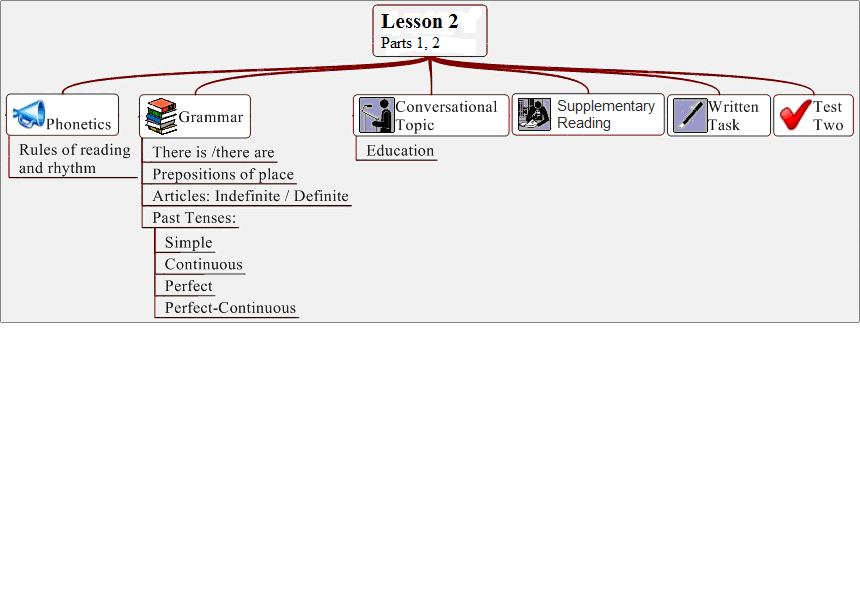 LESSON TWO. Part one 1  . Phonetics . Phonetics1.1. Rules of reading and rhythm Study Phonetic reference Practice in Reading Task 1: Read the tongue twisters. Notes: 1). You shouldread English sounds much more distinctly than Ukrainian ones. Stress those words which seem to be most important in sense. 2). English sentences are read quicker because the words are connected, not each of them is stressed. Practice the reading. We surely shall see the sun shine soon. On the beach I saw six small seals. Three grey geese in the green, green grass. The rat ran by the river with a lump of raw liver. Peter Piper picked up a piece of pink paper. There’s no need to light a night – light on a night like tonight. Pink silk socks with seven spots are lying on the sofa. Thirty three yellow flowers for thirteen lucky thieves. Task 2: Compare the reading of the pairs of words.
Task 3: Read some sayings and verses then translate them: - Step by step one goes far. - As smug as a bug in a rug. - He laughs best who laughs last. - As busy as a bee. - Just think and think, what horses get to drink. - In the night I slept, After dinner I swept, In the evening I met My dear cousin Ted. - Hearts like doors will open with ease to very, very little keys; And don’t forget that they are these: “We thank you all” and “If you please.” - Flowers here, flowers there, flowers growing everywhere. - Always in a hurry, always behind. 1.2. Language Focus Moods and feelings: How can a person feel about the following things? – career, family, study, travelling, cooking, exercising, sport, marriage, money, housework, gardening, health, work, good / bad news, driving, friendship, shopping. These words can help you make a proper answer: - angry, cross, annoyed, frustrated; - surprised, shocked, amazed, puzzled, astonished; - happy, glad, pleased, relaxed, joyful, perfect, fantastic, cheerful, optimistic; - tired, exhausted, bored, sleepy; - stressed, worried, tense, moody, terrible, thoughtful; - afraid, frightened, scared; - sad, miserable, unhappy, pessimistic, dull. 2  . Grammar . Grammar2.1. There is / there are Study grammar reference Revision 1: Compare the pairs of sentences and their translations in Ukrainian:
Revision 2: Study the sentences with There is / There are. 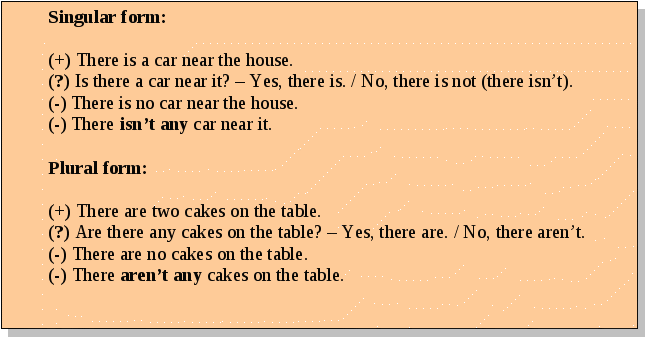 Practice –Grammar in use Task 1: Use ‘There is / There are’ to describe your flat / house (an entrance hall, a living room, a bedroom, a study, a bathroom, a kitchen.) You can also use the following adjectives: cosy, comfortable, spacious, small, large, old, new, cheep, expensive, modern, old-fashioned and decorated and prepositions: on, in, under; in front of, behind; near, at, by, next to; over, above; on the right, on the left; in the middle of, in the centre of between. Task 2: Read and translate the sentences (starting from the end.) 1. There are some buildings of modern design in this street. 2. There is not much light in the rooms of the first floor. 3. There is some money in my pocket. 4. Is there any work at our office today? 5. There is little snow in this part of the country. 6. What is there in the cupboard? Task 3: Translate into English. 1. У цьому місті знаходиться кілька красивих вулиць. 2. В його кімнаті є кілька стільців і стіл. 3. Зліва від стола, поруч з дверима, стоїть диван, він дуже старий. 4. Скільки кімнат у вашій квартирі? 5. Які університети є у столиці України? 5. У цьому місті немає метро. 6. У кімнаті знаходиться багато картин? Task 4: Make up sentences using ‘There is / There are’. E.g.: a lot of computers / in the classroom: There are a lot of computers in the classroom.
2.2. Articles Study grammar references. Mind the main difference between the articles: indefinite -a / an and definite - the. Compare the examples:
2. 3. Nouns: Singular and plural Revision 1: Study the table below 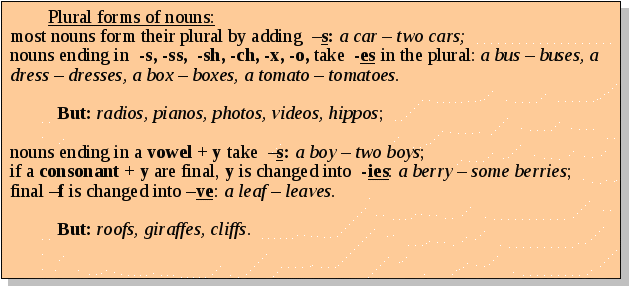 Revision 2: Irregular nouns: from singular to plural child – children, one man – two men, one woman – two women, goose – geese, tooth – teeth, foot – feet, ox – oxen, mouse – mice, one sheep – two sheep, one deer –three deer Help: Preposition – прийменник Noun - іменник (In)definite – (не)означений Singular – однина Plural – множина Tongue twister – скоромовка Advice – порада /pieces of advice - поради (Ir)regular – (не)правильні 2.4. Past Simple Study grammar references then revisions. Revision 1: Regular and irregular verbs  Important! Learn three forms of irregular verbs as be – was / were – been; begin – began – begun, etc. One of the best ways to learn them is to make up sentences as in the example: 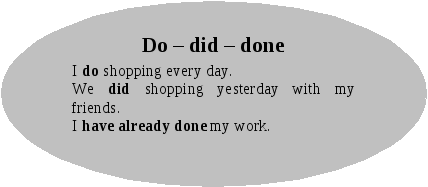 Revision 2: Study the table of the English grammar tenses.
Revision 3: Study the situations when the past simple tense is used. An action that happened: 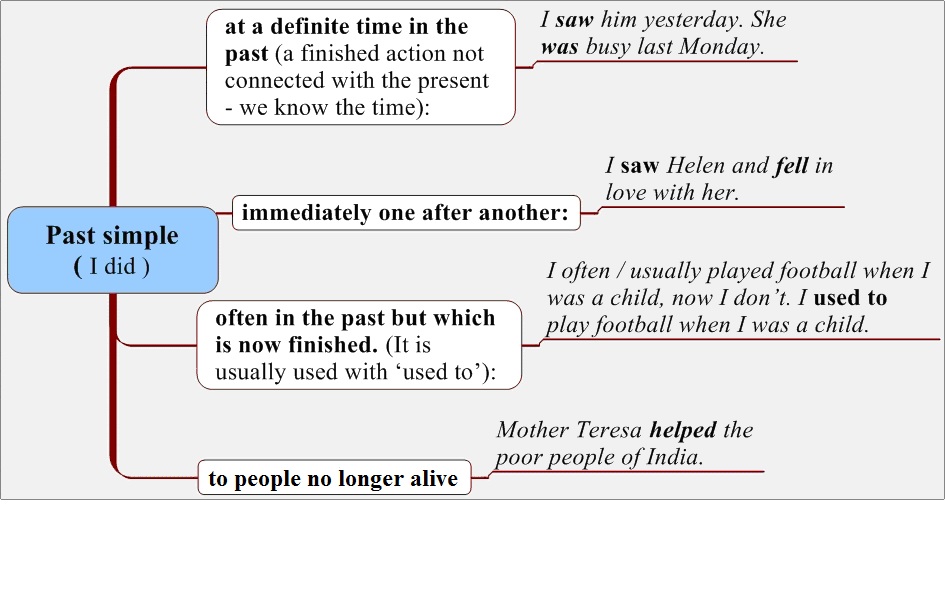 Important! As there are different tenses for present, past and future, TIME EXPRESSIONS help differentiate the tenses. Learn and use them in the right place.  Practice –Grammar in use Task 1: Make up sentences in the past simple with each of the time expression. Task 2: Translate into Ukrainian. 1. We didn’t see the film last week. 2. I didn’t work on Friday because I had a terrible headache. 3. He was absent yesterday. 4. His performance last Friday impressed the audience. 5. How did you spend your week-end? 6. Were you busy yesterday evening? I couldn’t find you anywhere. 7. I used to eat much junk food, now I don’t. 8. We used to play football every day when I was a teenager. Task 3: Translate into English. 1. Де ви були вчора ввечері? 2. Вона не зрозуміла вас тоді. 3. Коли ви поступили в університет? 3. Вчора було холодно? 4. Вас не було вчора на роботі, ви були хворі? 5. Коли ви народилися? Task 4: Read the verse for fun. How many tenses does it contain? I have a dog, I had a cat. I’ve got a frog Inside my hat. 2.5. Past Continuous  Revision 1: Study the table above and then grammar references. Revision 2: Study the situations when the past continuous tense is used.
 Help: Immediately – відразу Used to - зазвичай, бувало Alive – живий Revise – повторювати In progress – у розвитку While – в той час як Stated – призначений Interrupt – перебивати Simultaneous – одночасний Background - фон Practice – Grammar in use Task 1: Make up sentences in the past continuous with each of the time expression. Task 2: Translate a traveller’s tale into Ukrainian. Mind the situations where past continuous and past simple are used. In the autumn of 1935, when I was a young man, I was travelling in India. One evening I was returning home. On my right there was a wide river; on my left, a thick dark forest. It was getting dark, and I was walking along a narrow path. Suddenly I saw two green eyes looking at me from among the trees. A man-eating tiger was getting ready to jump on me. What could I do? I looked to the right. In the river there was an immense crocodile waiting to welcome me with its mouth wide open. I was so frightened that I shut my eyes. I heard branches moving as the tiger jumped. I opened my eyes. The tiger jumped right over me and was now in the jaws of the crocodile. |
